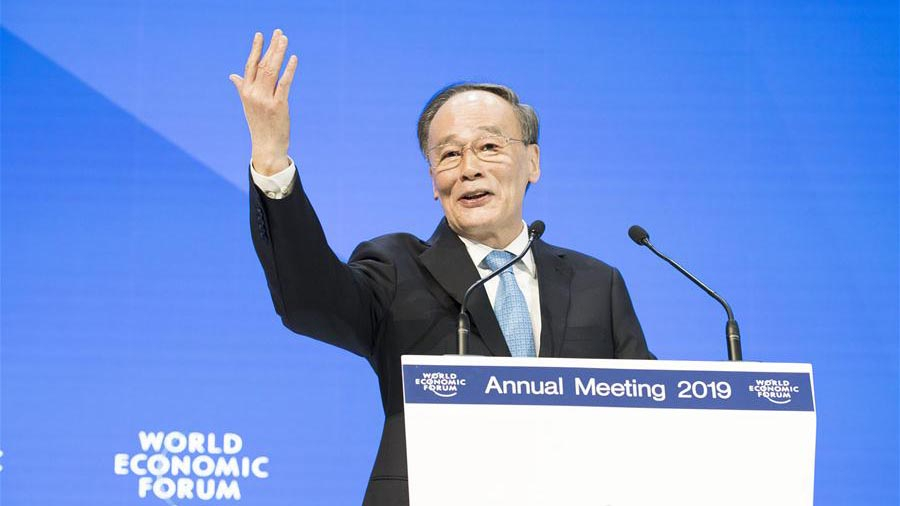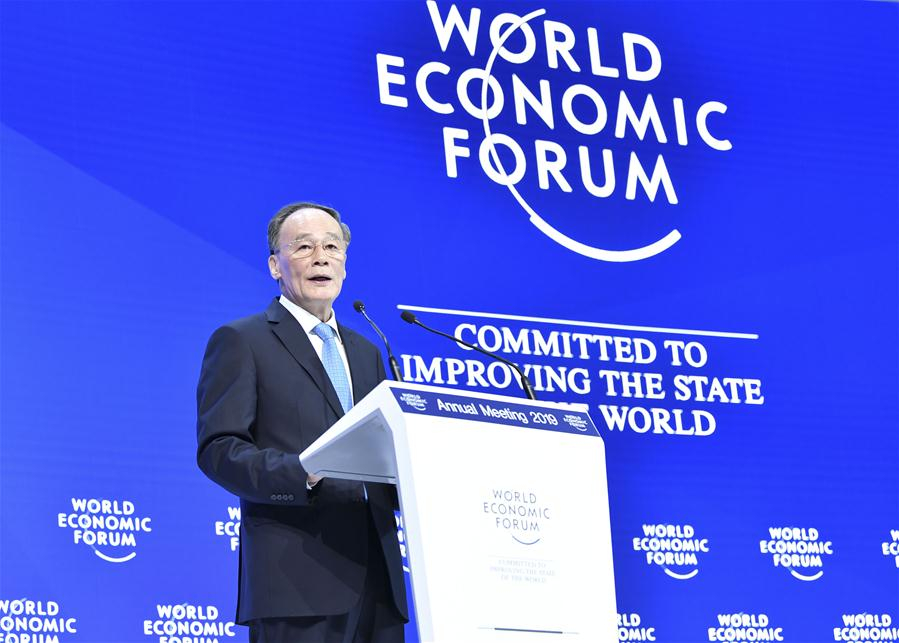
World
22:03, 23-Jan-2019
Chinese VP calls for structural reform to address global imbalances
Updated
10:28, 24-Jan-2019
CGTN
21:06

Chinese Vice President Wang Qishan on Wednesday called for further development as a solution to addressing imbalances in the process of economic globalization.
In a special address at the 2019 annual meeting of the World Economic Forum (WEF), Wang urged countries to press ahead with structural reform, strike a right balance between equity and efficiency, adopt effective policy measures to prevent the worsening of income inequality and fend off the impact on some regions and industries caused by new technologies and market competition so that all people stand to gain from continued development.
"What we need to do is (to) make the pie bigger while looking for ways to share it in a more equitable way. The last thing we should do is to stop making the pie and just engage in a futile debate on how to divide it. Shifting blame for one's own problems onto others will not resolve the problems."
China's philosophy for development
Looking back at the twists and turns China has experienced through four or five generations, particularly those in the past 70 years since the founding of the People's Republic of China in 1949, Wang pledged to continue to carry on the philosophy that has bestowed China with great achievements.

Chinese Vice President Wang Qishan addresses the 2019 annual meeting of the World Economic Forum in Davos, Switzerland, January 23, 2019. /Xinhua Photo
Chinese Vice President Wang Qishan addresses the 2019 annual meeting of the World Economic Forum in Davos, Switzerland, January 23, 2019. /Xinhua Photo
"We will stay true to the founding mission of the Communist Party of China, uphold its leadership and China's fundamental socialist political and economic systems and be guided by a people-centered development philosophy," Wang said.
The global economy
In his speech, the Chinese vice president accepted that in recent years, problems in the global economy such as lack of new growth drivers, unbalanced development and uneven income distribution have intensified.
In the face of new challenges, "many countries are increasingly looking inward when making policies; barriers to international trade and investment are increasing; and unilateralism, protectionism and populism are spreading in the world," Wang pointed out.
He stressed China's contribution to this.
"The nearly 1.4 billion Chinese who are enjoying greater prosperity have unleashed huge demand backed by purchasing power. And this has unlocked an enormous market potential that no one can afford to ignore."
The impact of technology
In his speech, Wang said technology has brought opportunities and risks alike to the whole world.
"Every major breakthrough in scientific discovery and technological innovation has greatly boosted human development and progress, but it has also led to the restructuring of value chains, industrial chains and supply chains, and disrupted the balance in the economy and society and between countries and regions."
He suggested all countries' interests should be taken into consideration.
"We need to accommodate in a balanced manner the interests of all countries, especially those of emerging markets and developing countries. One should not ask the whole world to address only the security concern and comply only with the standards of developed countries or individual countries."
At the invitation of President Ueli Maurer of the Swiss Confederation and Founder and Executive Chairman of the WEF Klaus Schwab, Wang is attending the WEF January 21-24.
The WEF's annual meeting kicked off in Davos on Tuesday, with the theme of "Globalization 4.0: Shaping a Global Architecture in the Age of the 4th Industrial Revolution."
Over 3,000 participants from across the world are taking part in over 350 sessions and workshops.
(With inputs from Xinhua)

SITEMAP
Copyright © 2018 CGTN. Beijing ICP prepared NO.16065310-3
Copyright © 2018 CGTN. Beijing ICP prepared NO.16065310-3